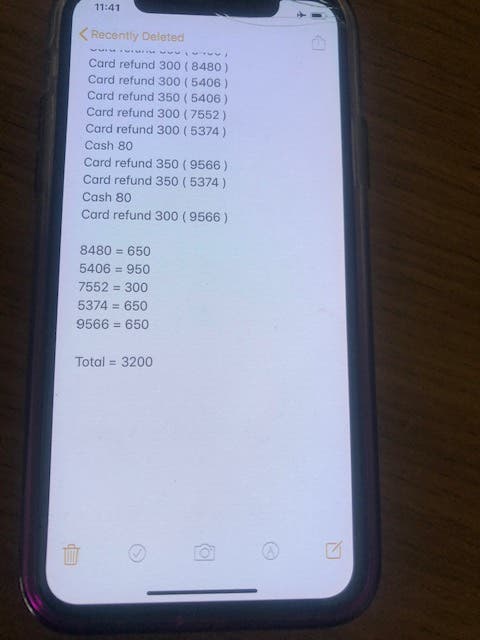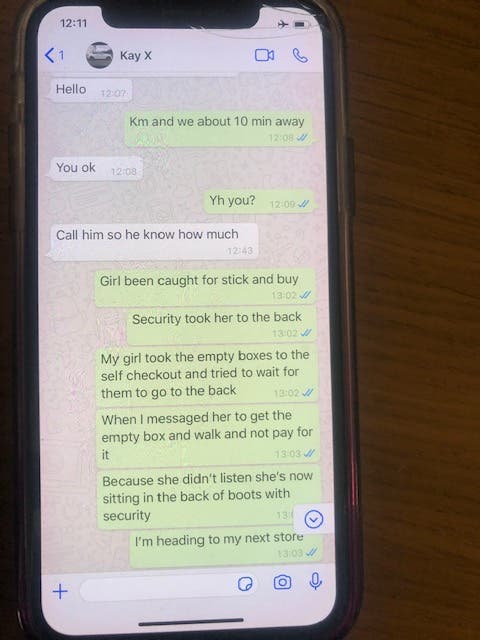Criminal gang recruited at least 30 vulnerable girls and used them to carry out fraud in retail stores to make £500,000 in profit while treating them ‘like cattle’
Dozens of teenage girls have been trafficked and exploited to commit acts of fraud by an organised crime group in what is believed to be the first modern slavery case of its kind in UK law.
Four members of a criminal enterprise based in Cambridge, London and Essex have been convicted of modern slavery and fraud offences after at least 30 vulnerable girls aged 14 to 17 were recruited and used to carry out theft and fraud for the gang over a period of more than two years.
Most of the victims were recruited via social media while housed in foster placements or semi-independent living facilities, and many suffered from abandonment issues or had learning difficulties such as ADHD. It is thought that the gang targeted girls with existing vulnerabilities.
The girls would be driven to established retailers across the UK and told to ask for refunds on high-value items using fake receipts and barcodes produced by Isaiah Olugosi, who orchestrated the operation. They were also sometimes told to shoplift high-value goods.
On 20 May 2021, Olugosi, of Ely in Cambridgeshire, pleaded guilty to conspiracy to arrange or facilitate the travel of children for the purposes of exploitation, two counts of conspiracy to defraud, money laundering and possession of articles for use in fraud at Snaresbrook Crown Court.
It is believed to be the first time the Modern Slavery Act has been applied to a fraud enterprise in UK law.
The UK’s independent anti-slavery commissioner Dame Sara Thornton said she welcomed the use of the Modern Slavery Act legislation to deal with this “substantial and serious exploitation of vulnerable people”.
“It is really encouraging to see police and prosecutors using the trafficking legislation rather than opting for lower level offences which might be easier to prove,” she added.
Olugosi’s victims would often be missing for several days, committing fraud during the day – driven by the gang on pre-planned “routes” to target branches of each retailer – and being housed in hotels each night, where gang members are alleged to have sexually exploit at least two of them.
A typical day would include theft and fraud from over ten stores, making thousands of pounds per route for the gang. The funds gained were laundered through at least 100 UK bank accounts, often in the girls’ names or those of adults with mental health problems and other vulnerabilities.
If they were stopped by security they were left to deal with the consequences and in some cases this meant them being abandoned many miles from home.
Marie Olo, of the Crown Prosecution Service, which brought charges, said the girls were “selected because they were vulnerable with difficult backgrounds or mental health issues”, and that when they were caught, Olugosi was “perfectly willing to step back and let them face arrest and potential prosecution”.
Notes on one of the gang member’s phones show how they calculated the profits made from the fraudulent activity

In a statement to the court, one of the victims, who has ADHD and a personality disorder, said: “My bank accounts have since been closed due to the amount of refunds that they put through my account. I can no longer receive my disability allowances and this now has to be paid into my mum’s bank account. This whole situation has been playing on my mind, it has affected me mentally.”
Another victim said: “I look back at that whole time and feel I was stupid and vulnerable and taken advantage of… I am shocked that they have been getting away with this for so many years. It’s like they are the mafia.”
Sgt Jones, of the Metropolitan Police’s Predatory Offender Unit, who worked on the case, said text messages showed the defendants talking about the girls “as if they were cattle”.
“The way they were discussing the girls was as a commodity. It was, ‘we haven’t fed them yet’. ‘What are you gonna feed this one?’ and ‘That one belongs to me, that one’s my one. No, no, you get your own girls, I’ve got my girls in this route’,” he told The Independent.
One girl alleged that she began a sexual relationship with Olugosi when she was 17 years old and that he hid from her the fact that he was married. She took an overdose the day she decided to stop working for him, she told the court while giving evidence.
The criminal group yielded approximately £500,000 in profits as a result of the large-scale fraud conspiracy between January 2018 and March 2020.
Text messages between ‘Kay’ (Olugosi) and Eva Dambrauskaite, who was tasked with recruiting and managing the vulnerable young girls

To evade authorities, mobile telephones and vehicles were registered at addresses of adults with mental health or severe learning difficulties.
From at least January 2018, Olugosi began making money by targeting two retailers, Tesco and Boots, using fraudulent receipts and printed barcodes produced at his home. Bank data shows proceeds of crime entering the accounts as far back as 2013.
The operation was too large for one person to control alone and Olugosi quickly began to build up a network of trusted associates including “team leaders” and drivers who were willing to take part in this criminal enterprise across the country.
Two of his team leaders, Eva Dambrauskaite and Baran Karamagara, were tasked with recruiting and managing the vulnerable young girls. They would approach them on the street or by Snapchat or other social media.
Once one girl had done one route she would be paid £100 and told she would get an additional £50 if she brought a friend next time. “They would insinuate themselves into different peer groups and just work through them,” said Sgt Jones.
Over the course of Olugosi’s highly profitable criminal enterprise, his wife Holly Olugosi spent large sums of money on luxury items including cosmetic surgery, tanning sessions, a new Mercedes, luxury holidays, and even a fridge costing £2,500.
She pleaded guilty to money laundering at Snaresbrook Crown Court on 20 May 2021.
Karamagara, of Tottenham in London, pleaded guilty to conspiracy to arrange or facilitate the travel of children for the purposes of exploitation and two counts of conspiracy to defraud at Snaresbrook Crown Court on 17 December 2021.
Dambrauskaite, of Buckhurst Hill in Essex, was found guilty on Thursday after a three-week trial at Snaresbrook Crown Court of both counts of fraud, modern slavery, possession of articles for use in fraud and money laundering.
They will be sentenced between 18 and 22 April at Snaresbrook Crown Court.Officers from the Met’s Predatory Offender Unit were first alerted to the actions of this organised crime group after receiving intelligence from partners within Children’s Services and when offences were highlighted by the retailers who had been targeted.
Beginning in March 2020, Predatory Offender Unit officers executed a number of search warrants in London, Essex and Cambridge where they seized evidence including printers, computer equipment, fake receipts, bar codes, cash and devices used to communicate with the girls.
Sgt Jones said: “This is a serious case involving the criminal exploitation of a large number of juvenile girls spanning many years. Olugosi and others were too cowardly to execute their own crimes, and actively recruited girls with obvious vulnerabilities. They insinuated themselves through peer groups of vulnerable people, using them to commit fraud and using their accounts to launder money.
“This was a protracted investigation which involved countless enquiries, witness statements and searches of premises to secure evidence from offences as widely spread as Glasgow and Devon. Throughout the proceedings, all of the suspects in this case did everything they could to conceal evidence, minimise their own involvement and delay justice.
“I am thankful to the staff from both retailers for highlighting this case as a safeguarding concern from the outset, voicing concerns about the ages of the girls involved.”
Ms Olo added: “Exploiting others for criminal gain is a serious criminal offence and wherever possible the CPS will work with police to help victims escape the clutches of modern slavery, while prosecuting the people who have pulled the strings.”
